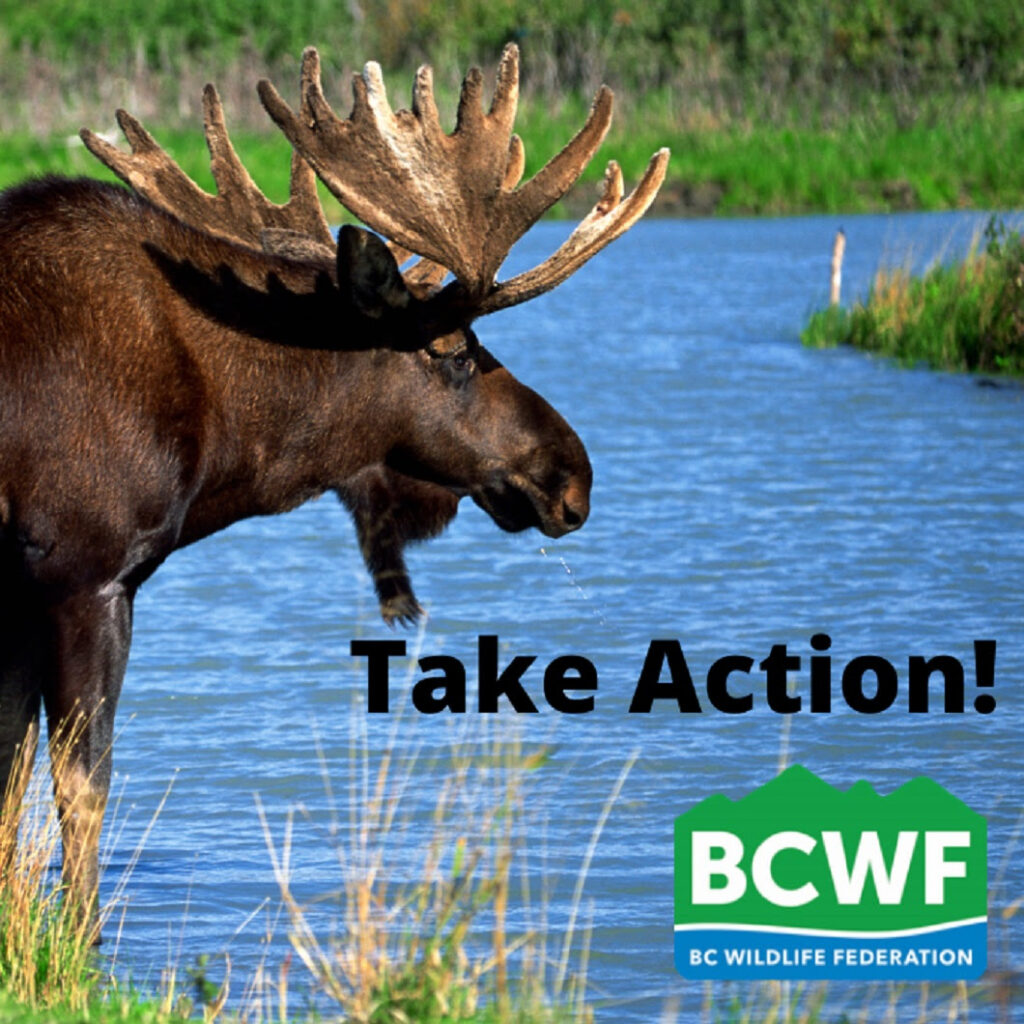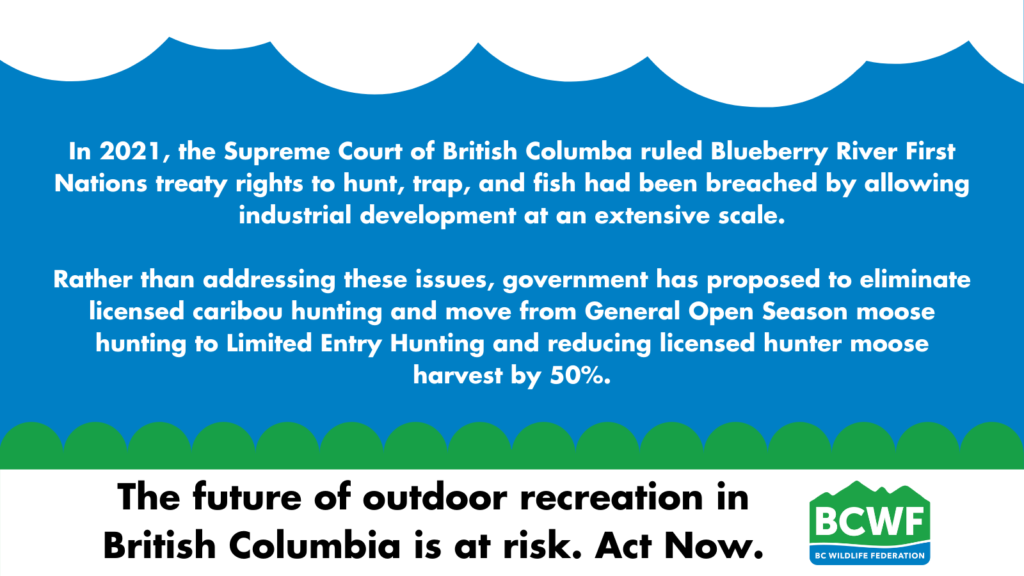
Coles Notes:
- The Blueberry River First Nation is a Treaty 8 signatory. They have a treaty right to practice their way of life;
- A chief of the BRFN took the province to court, arguing that the cumulative impacts of industrial activity in BRFN traditional territory amounted to a breach of Treaty 8 ;
- The court found in favour of BRFN and ordered the province to negotiate a settlement in regard to the cumulative effects of industrial activity ;
- The province declined to appeal the decision and entered negotiations ;
- In response to the cumulative effects of industrial activity the province has proposed the suspension of the sustainable hunting of caribou across 7B (not of endangered herds, but of all herds) and reduction of residential moose harvest by 50% along with a change to LEH for moose ;
- This proposal is not science based – the harvest of both species is more than sustainable ;
- This proposal does not follow the province’s own guidelines and is in conflict with the goals expressed in the Together for Wildlife process that First nations, government and stakeholders spent the last 2 years pursuing;
- It is not clear that all Treaty 8 First Nations even asked for this solution;
- This is a terrible proposal that damages caribou restoration, hurts the economy, punishes resident hunters and throws the process of truth and reconciliation into reverse ;
- If you care about outdoor recreation, fish, wildlife and habitat you should vigorously oppose this proposal.
At the bottom of this page we’ll show you how to do that.
BCWF recently circulated the following op-ed:
The provincial government has floated a proposal that puts at risk the rights of all British Columbians to enjoy the outdoors in exchange for continued industrial exploitation of the Peace-Liard region, which makes up nearly 22% of the province of British Columba.
Do you value your right to hike, camp, fish and enjoy a pristine environment? Well, hang on.
The Supreme Court of British Columbia ruled late last year that the Blueberry Nation’s treaty rights to hunt, trap and fish in their territory have been breached “by allowing industrial development in Blueberry’s territory at an extensive scale.”
As part of this proposal, the moose harvest will be cut by 50 per cent and caribou hunting closed across the region, while 195 gas, oil and forestry projects will continue, with 20 more up for negotiation.
Maybe you aren’t a hunter. Maybe the Peace-Liard sounds like it’s awfully far away and maybe it is. But here’s why you should care.
When access to the backcountry and the natural assets of this great province become bargaining chips to be dealt away for industrial development, we all lose. And the environment will lose, too.
Is this the model of the future, where the provincial government approves unsustainable resource extraction and squares the equation on the backs of British Columbians who are simply looking to connect with nature?
The BCWF is concerned that this is the tip of the iceberg and that these kinds of deals are coming to parks, campsites, streams and lakes in British Columbia.;
If you’re a hiker, camper, hunter, angler or snowmobiler you should be concerned about the precedent this proposal sets. The government seems happy to trade away your connection to nature in favour of continued industrial encroachment.
There is a great deal to like about the Blueberry deal. The government committed $65 million for land restoration and related projects in an area that is riddled with logging, gas wells, and access roads, all of which are a threat to wildlife.
It’s an important step toward reconciliation. The BC Wildlife Federation fully supports the rights of First Nations to hunt and fish in their traditional territories for food, social and ceremonial purposes and our commitment to conservation and habitat restoration is shared between First Nations and non-First Nations.
But we must all be able to share our outdoors spaces, together.
According to the court ruling that triggered the deal, the cumulative effects of oil and gas, forestry, mining, hydroelectric infrastructure, and agricultural clearing “has resulted in significant adverse impacts on the meaningful exercise of their treaty rights, and that amount to a breach of the Treaty.”
More than 84 per cent of Blueberry River territory is within 500 metres of industrial activity, which marginalizes their treaty rights to hunt, fish, and trap.
This proposal does nothing to mitigate those impacts nor does it provide support for on-the-ground actions that benefit wildlife and habitat in Treaty 8 territory.
Instead of addressing real concerns about environmental degradation that all First Nations and non-First Nations people share, this approach ensures continued industrial expansion.
Worse, by trading away the rights of British Columbians, the government has created a template for similar deals across the province.
Are you prepared to lose access to your favourite hiking paths, fishing streams, BC parks, campsites and snowmobile trails? That dark future may already be here.
The BCWF advocates for conservation on behalf of more than 43,000 member British Columbians.
So?
What can you do?

- Email your MLA.
- If you are a North Shore resident your MLAs are:
- Susie Chant, North Van-Seymour susie.chant.MLA@leg.bc.ca , phone 604-983-9859
- Bowinn Ma, North Van-Lonsdale bowinn.ma.MLA@leg.bc.ca, phone 604-981-0033
- Karin Kirkpatrick, West Van-Capilano, karin.kirkpatrick.MLA@leg.bc.ca, phone 604-981-0050
- Jordan Sturdy, West Van- Sea to Sky, jordan.sturdy.MLA@leg.bc.ca, phone 604-894-9403
- If you live somewhere else you can find your MLA contact details here: https://www.leg.bc.ca/learn-about-us/members
- Write an old fashioned letter to your MLA
- Meet in person or by Zoom with your MLA (it’s their job to meet with you and it’s not as hard or scary as you might think).
- Go to BCWF’s website here, scroll to the bottom and send a form letter to your MLA.
- Go to the province’s Angling, hunting and trapping engagement site (AHTE) and leave a comment. You will need to have or will need to get a BCeID number. Click on “Login” to do either (you can get a basic BCeID from the Login page). Once you’re logged in you can vote to oppose the changes and leave a comment.
- Go to Howl For Wildlife and follow the directions. Howl For Wildlife is a continent wide advocacy platform that sends your message to all 86 MLAs.
- Get on social media and like and share Twitter, Facebook and Instagram posts highlighting this issue.
- If you are a North Shore resident your MLAs are:
At a minimum do one of these things, but better yet, do them all and then go even further. This isn’t just about preserving resident hunting in the Peace. It’s about managing fish, wildlife and habitat throughout the province in a sustainable way, informed by science and Indigenous knowledge, and it’s also about advancing reconciliation. Blueberry River isn’t the bad guy here. They didn’t breach the treaty – the government did, and now the same government is trying to make a quick deal rather than solve the problem they created.
If we let the government get away with this they will repeat the tactic throughout the province.
If that happens we all lose.
If you are not yet a member of North Shore Fish and Game and would like to join, go to our Membership page here or straight to our online Membership form here.
